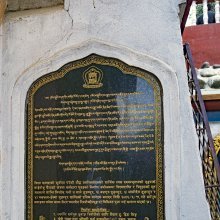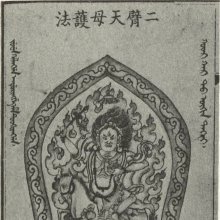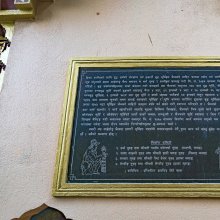Shrimati, Śrīmati, Śrīmatī: 11 definitions
Introduction:
Shrimati means something in Hinduism, Sanskrit, Jainism, Prakrit, biology, Tamil. If you want to know the exact meaning, history, etymology or English translation of this term then check out the descriptions on this page. Add your comment or reference to a book if you want to contribute to this summary article.
The Sanskrit terms Śrīmati and Śrīmatī can be transliterated into English as Srimati or Shrimati, using the IAST transliteration scheme (?).
Images (photo gallery)
In Hinduism
Purana and Itihasa (epic history)
Source: archive.org: Puranic Encyclopedia1) Śrīmatī (श्रीमती).—A Gandharva maid. In Kamba Rāmāyaṇa, Yuddhakāṇḍa there is a story associating this Gandharva maid with the churning of the ocean of milk:—
A Gandharva maid named Śrīmatī who had acquired incomparable proficiency in music used to sing hymns in praise of Lakṣmīdevī. Devī appeared before her and presented a garland of Kalpaka flowers to Śrīmatī. As she was returning with the garland, she met sage Durvāsas on the way. She offered the garland to him. Durvāsas who reached Devaloka with the garland gave it to Indra. Indra used it for adorning the tusk of Airāvata. Airāvata who was annoyed at it threw it away in a fury. Durvāsas took it as a personal insult to him and in his rage cursed all the gods to be subjected to the infirmities of old age. It is to save them from the effects of old age that the ocean of milk was churned to obtain Amṛta. (For more details see under Amṛta).
2) Śrīmatī (श्रीमती).—A woman follower of Subrahmaṇya. (Mahābhārata Śalya Parva, Chapter 45, Verse 3).
Source: archive.org: Shiva Purana - English TranslationŚrīmatī (श्रीमती) is the daughter of king Śīlanidhi, according to the Śivapurāṇa chapter 2.1.3:—“[king Śīlanidhi] called his daughter Śrīmatī and asked her to kneel down at the feet of Nārada. [...] She has attained the marriageable age. She is in search of a qualified bridegroom. She has all charms and accomplishments and her Svayaṃvara is imminent”.
Addressing the king [Śīlanidhi], he [Nārada] said thus:—“O great king, this daughter [Śrīmatī] of yours is endowed with all characteristics: She is highly fortunate and blessed like Lakṣmī. She is an abode of all qualities. Her future husband will certainly be a splendid God, lord of all, unvanquished, heroic, on a par with Śiva, and Vying with Kāmadeva”. Having said this, the casual visitor Nārada took leave of the king. Deluded by Śiva’s Māyā he was extremely oppressed by love.
Source: JatLand: List of Mahabharata people and placesŚrīmatī (श्रीमती) refers to the name of a Lady mentioned in the Mahābhārata (cf. IX.45.3). Note: The Mahābhārata (mentioning Śrīmatī) is a Sanskrit epic poem consisting of 100,000 ślokas (metrical verses) and is over 2000 years old.

The Purana (पुराण, purāṇas) refers to Sanskrit literature preserving ancient India’s vast cultural history, including historical legends, religious ceremonies, various arts and sciences. The eighteen mahapuranas total over 400,000 shlokas (metrical couplets) and date to at least several centuries BCE.
In Jainism
General definition (in Jainism)
Source: Wisdom Library: JainismŚrīmati (श्रीमति) is the wife of Abhicandra, who is a kulakara (law-giver) according to Digambara sources, while Śvetāmbara names his wife as Pratirūpā. The kulakaras (similair to the manus of the Brahmanical tradition) figure as important characters protecting and guiding humanity towards prosperity during ancient times of distress, whenever the kalpavṛkṣa (wishing tree) failed to provide the proper service.
These law-givers and their wifes (e.g., Śrīmati) are listed in various Jain sources, such as the Bhagavatīsūtra and Jambūdvīpaprajñapti in Śvetāmbara, or the Tiloyapaṇṇatti and Ādipurāṇa in the Digambara tradition.
Source: archive.org: Trisastisalakapurusacaritra1) Śrīmatī (श्रीमती) previously incarnated as Svayamprabhā, according to chapter 1.1 [ādīśvara-caritra] of Hemacandra’s 11th century Triṣaṣṭiśalākāpuruṣacaritra: an ancient Sanskrit epic poem narrating the history and legends of sixty-three illustrious persons in Jainism.
Accordingly, “[...] in a short time Svayamprabhā, afflicted by grief, devoted to works of dharma, also fell like Lalitāṅga. In this same province in the city Puṇḍarīkiṇī, she became the daughter of the Cakrin Vajrasena and his wife Guṇavatī. She was endowed with beauty surpassing all the world, and was named Śrīmatī by her parents. Cared for by nurses like a creeper by women-gardeners, she grew up gradually, her body delicate and her hands like shining blossoms. As a jewel adorns a gold ring, youth adorned her making the sky blossom, as it were, with her glossy beauty”.
2) Śrīmatī (श्रीमती) is the wife of king Śrīdhara from Vijayapura, according to chapter 4.2 [vāsupūjya-caritra].—Accordingly:—“Vindhyaśakti wandered in existence for a long time, adopted Jain garb in one birth, died, and became a kalpa-god. When he fell, he was born the son, Śrīmant Tāraka, of King Śrīdhara by his wife Śrīmatī in Vijayapura. [...]”.
3) Śrīmatī (श्रीमती) is the wife of king Bala of Kauśāmbī, according to chapter 5.1 [śāntinātha-caritra].—Accordingly, “[...] At that time the King of Kauśāmbī, Bala by name, very powerful, sent his daughter, Śrīkāntā, daughter of Queen Śrīmatī, a beautiful young woman, in great style at her choosing of Induṣeṇa, son of Śrīṣeṇa. Induṣeṇa and Binduṣeṇa noticed an extremely beautiful courtesan, Anantamatikā, who had come in attendance on her. [...]”.
4) Śrīmatī (श्रीमती) is the wife of the Vidyādhara king Atīndra from Meghapura, according to the Jain Ramayana and chapter 7.1 [origin of the rākṣasavaṃśa and vānaravaṃśa].—Accordingly:—“[...] At that time there was a renowned king of Vidyādharas, Atīndra, in the city Meghapura on Mount Vaitāḍhya. By his wife, Śrīmatī, he had a son, Śrīkaṇṭha, and a daughter, Devī, like a goddess in beauty. The Vidyādhara-lord, Puṣpottara, lord of Ratnapura, asked the fair-eyed maiden in marriage for his son Padmottara. By the decree of fate, Atīndra did not give her to him, though he was meritorious and distinguished, but he gave her to Kīrtidhavala. [...]”.
5) Śrīmatī (श्रीमती) is the wife of the Vidyādhara-lord Jvalanaśikha, according to the Jain Ramayana and chapter 7.2.—Accordingly, “Now, in the city Jyotiḥpura on Mt. Vaitāḍhya there was a Vidyādhara-lord, Jvalanaśikha. He had a beautiful queen, Śrīmatī, and by her a bright-eyed daughter, Tārā. One day Sāhasagati, the son of Cakrāṅka, a Vidyādhara-king, saw her and was immediately wounded by love. Sāhasagati asked Jvalana for her through agents and also Sugrīva, king of the Vānaras (asked for her). [...]”.
Source: academia.edu: Tessitori Collection IŚrīmatī (श्रीमती) refers to one of the “sixteen virtuous Jain women”, according to the “Sola satyā” (dealing with the lives of Jain female heroes), which is included in the collection of manuscripts at the ‘Vincenzo Joppi’ library, collected by Luigi Pio Tessitori during his visit to Rajasthan between 1914 and 1919.—There is a list of sixteen virtuous Jain women. [...] These women [e.g., Śrīmatī] are virtuous because they uphold Jain values and could stand to them even in adverse circumstances. Reciting their names is often part of the morning ritual. Behind names are eventful stories that have been told by several writers and read or listened to by Jain followers.

Jainism is an Indian religion of Dharma whose doctrine revolves around harmlessness (ahimsa) towards every living being. The two major branches (Digambara and Svetambara) of Jainism stimulate self-control (or, shramana, ‘self-reliance’) and spiritual development through a path of peace for the soul to progess to the ultimate goal.
Biology (plants and animals)
Source: Google Books: CRC World Dictionary (Regional names)Shrimati in India is the name of a plant defined with Jasminum grandiflorum in various botanical sources. This page contains potential references in Ayurveda, modern medicine, and other folk traditions or local practices It has the synonym Jasminum officinale L. fo. grandiflorum (L.) Kobuski (among others).
Example references for further research on medicinal uses or toxicity (see latin names for full list):
· Species Plantarum, ed. 2 (1762)
· Cytologia (1987)
· Journal of Cytology and Genetics (1989)
· Species Plantarum (1753)
· Journal of Cytology and Genetics (1988)
· Kew Bulletin (1997)
If you are looking for specific details regarding Shrimati, for example diet and recipes, pregnancy safety, extract dosage, chemical composition, health benefits, side effects, have a look at these references.

This sections includes definitions from the five kingdoms of living things: Animals, Plants, Fungi, Protists and Monera. It will include both the official binomial nomenclature (scientific names usually in Latin) as well as regional spellings and variants.
Languages of India and abroad
Sanskrit dictionary
Source: Cologne Digital Sanskrit Dictionaries: Edgerton Buddhist Hybrid Sanskrit DictionaryŚrīmati (श्रीमति).—f., name of a girl, associate (sister ?) of Śrīsaṃ- bhava (2): Gaṇḍavyūha 455.4 etc.; usually n. sg. °tiḥ etc., but °tī in list at the end 549.22, and acc. °tīṃ 466.11—12.
--- OR ---
Śrīmatī (श्रीमती).—(1) see prec.; (2) name of a daughter of Ghoṣila, married to Udayana: Divyāvadāna 541.19 ff.; (3) name of a member of (Bimbisāra's and) Ajātaśatru's harem: Avadāna-śataka i.308.10 ff. See also Śirīmatī, Śriyāmatī.
Source: Cologne Digital Sanskrit Dictionaries: Monier-Williams Sanskrit-English Dictionary1) Śrīmati (श्रीमति):—[=śrī-mati] [from śrī] f. (for matī ?) Name of Rādhā, [Monier-Williams’ Sanskrit-English Dictionary]
2) Śrīmatī (श्रीमती):—[=śrī-matī] [from śrī-mat > śrī] f. Name of one of the Mātṛs attendant on Skanda, [Mahābhārata]
3) [v.s. ...] of various women ([especially] of the mother of Mādhavācārya), [Buddhist literature; Catalogue(s)]
Sanskrit, also spelled संस्कृतम् (saṃskṛtam), is an ancient language of India commonly seen as the grandmother of the Indo-European language family (even English!). Closely allied with Prakrit and Pali, Sanskrit is more exhaustive in both grammar and terms and has the most extensive collection of literature in the world, greatly surpassing its sister-languages Greek and Latin.
Kannada-English dictionary
Source: Alar: Kannada-English corpusŚrīmati (ಶ್ರೀಮತಿ):—
1) [noun] a woman having wealth; a rich woman; a mistress.
2) [noun] a woman endowed with auspiciousness, a mode of respectful addressing of women.
--- OR ---
Śrīmati (ಶ್ರೀಮತಿ):—
1) [pronoun] a woman already referred to.
2) [pronoun] a woman as related to her husband.
Kannada is a Dravidian language (as opposed to the Indo-European language family) mainly spoken in the southwestern region of India.
Tamil dictionary
Source: DDSA: University of Madras: Tamil LexiconŚrīmati (ஶ்ரீமதி) noun < śrī-matī. A title prefixed to women’s names; பெண்டிர் பெயர் முன் வழங்கும் மரியாதைச்சொல்வகை. [pendir peyar mun vazhangum mariyathaicholvagai.]
Tamil is an ancient language of India from the Dravidian family spoken by roughly 250 million people mainly in southern India and Sri Lanka.
See also (Relevant definitions)
Full-text (+53): Radhika, Cimati, Palyadasi, Shakhin, Shrisambhava, Shriyamati, Nayika, Rajivalocana dhanvantari, Manjari, Nimbarka, Kayavyuha, Shri, Gunja, Manasarovara, Ashtasakhi, Rukmavant, HladiniShakti, Kesava, Divyonmada, Madhuryarasa.
Relevant text
Search found 38 books and stories containing Shrimati, Śrīmati, Srimati, Śrīmatī, Shri-mati, Śrī-mati, Sri-mati, Śrī-matī, Shrimathi, Shreemathi, Shrimadi, Shrimadhi; (plurals include: Shrimatis, Śrīmatis, Srimatis, Śrīmatīs, matis, matīs, Shrimathis, Shreemathis, Shrimadis, Shrimadhis). You can also click to the full overview containing English textual excerpts. Below are direct links for the most relevant articles:
Shrimati Hutheesing- A Daughter of the Dawn < [January-February 1935]
Triveni Golden Jubilee < [January – March, 1978]
South Indian Music - Srimati Saraswati Bai < [September-October, 1929]
Trishashti Shalaka Purusha Caritra (by Helen M. Johnson)
Part 14: Sixth incarnation as Vajrajaṅgha < [Chapter I]
Part 6: Story of Śrīmatī < [Chapter VII - The stories of Celaṇā’s one-pillared palace]
Part 3: Previous birth of Bandhudatta < [Chapter IV - The wandering and emancipation of Pārśvanātha]
Srila Gurudeva (The Supreme Treasure) (by Swami Bhaktivedanta Madhava Maharaja)
Remembering Kṛṣṇa’s pastimes and serving in separation < [Chapter 2.12 - Early ISKCON Conversations with Śrīla Gurudeva]
Birthplace of Śrīla Gurudeva < [Chapter 1.2 - Śrīla Gurudeva’s Pūrvāśrama]
Indications of Departure < [Chapter 2.19 - The Concluding Transcendental Pastimes]
Haribhakti-sudhodaya (by Tridandi Sri Bhakti Prajnan Yati Maharaj)
Brihad Bhagavatamrita (commentary) (by Śrī Śrīmad Bhaktivedānta Nārāyana Gosvāmī Mahārāja)
Verse 1.4.117-118 < [Chapter 4 - Bhakta (the devotee)]
Verse 1.7.7-9 < [Chapter 7 - Pūrṇa (pinnacle of excellent devotees)]
Verse 1.7.39-40 < [Chapter 7 - Pūrṇa (pinnacle of excellent devotees)]
Sanskrit sources of Kerala history (by Suma Parappattoli)
The Sucindram Inscription of Ramavarma (Dated 654 M.E.) < [Chapter 1 - Historical details from Sanskrit Inscriptions]
2. Balamartandavijaya by Devaraja-suri < [Chapter 5 - Sanskrit Dramas and Campus bearing on Kerala History]
Related products



